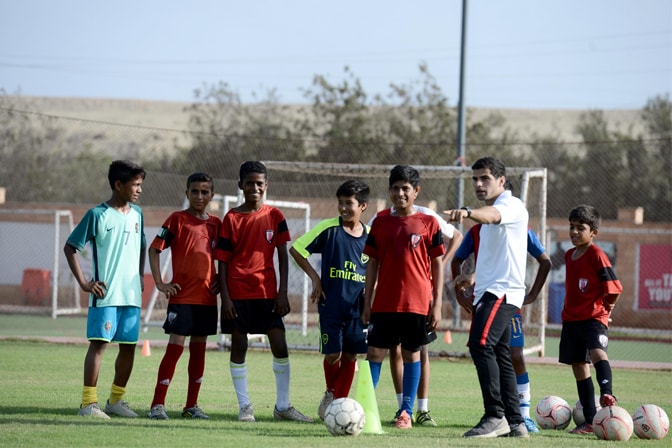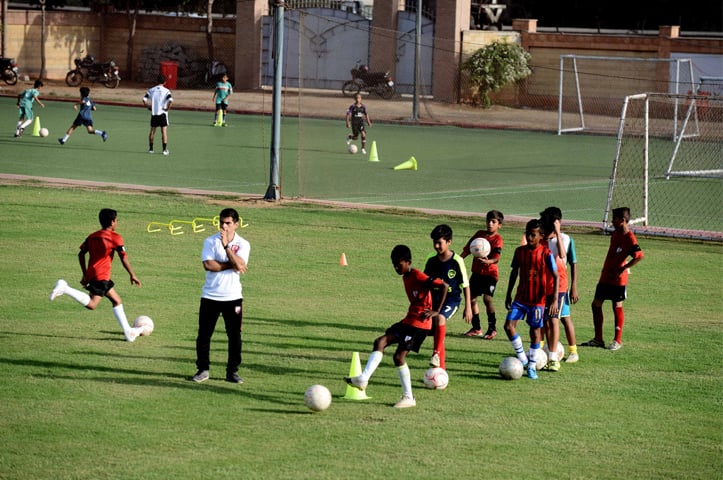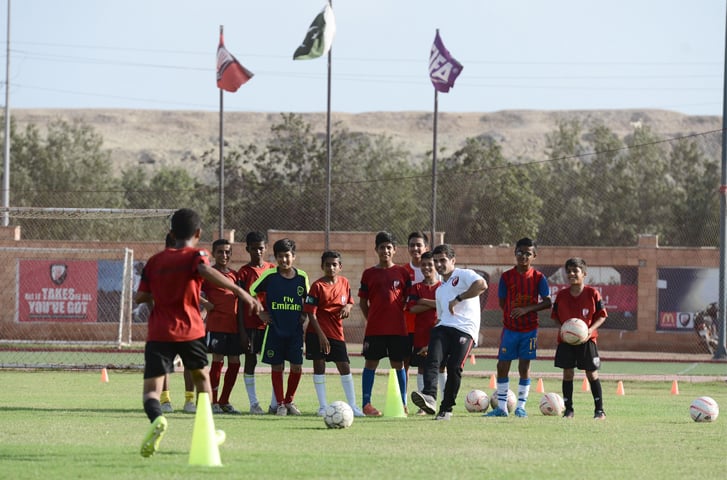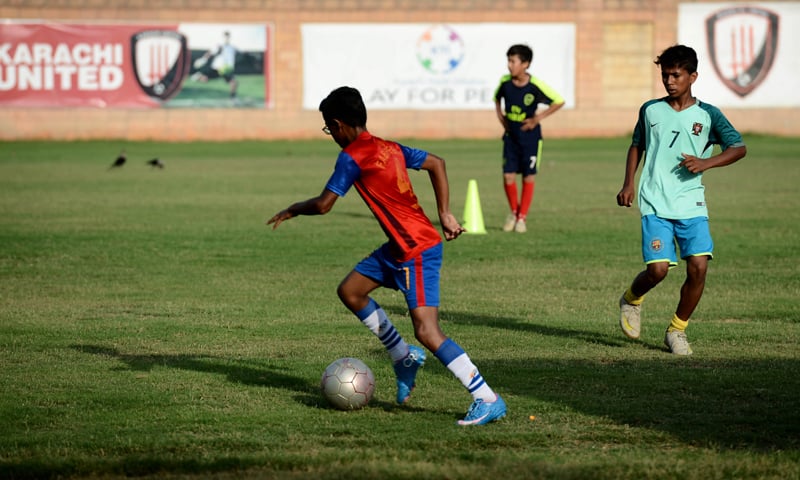by Ahmed Yusuf
It might not be Barcelona’s famed La Masia academy or the Ajax Youth Academy, but situated across the seashore, away from the commotion and cacophony of the city, the Karachi United (KU) Academy is constructing dreams of its own. Winners of an invitational U-12 cup in Guangzhou, China, and having also recently toured Barcelona, the academy is going places.
The facility opposite the seashore is the club’s elite academy. Two of the three men running the show — Academy Director Imran Ali and Academy Manager Kareem Kerai — are diehard fans of Liverpool Football Club. This association is central to their understanding of how football ought to be played.
“Pass and move,” says Imran when asked about KU’s football philosophy and style. “We want to play with the ball on the ground, we want to attack,” chimes in Kareem.
Karachi United has been in existence since 1996. Back then, it was a club comprising players from privileged backgrounds. But in the 21 years since, much has changed. Karachi United have become the voice of grassroots football — of providing a footballing education from a young age instead of the haphazard, often calamitous route many others adopt to make a career in football.
“We started with a dream and we haven’t stopped dreaming ever since,” says Imran. “We wanted to use football to change society and through this elite academy, we are on our way of doing just that.”
The current academy set-up is merely one-and-a-half years old. The training area is divided into three: a ground proper and two smaller pitches on the side. One of those pitches is an artificial turf — this enables the club to practice and play at night. “The Karachi Youth Initiative helped us install the artificial pitch,” explains Imran. “It has been a game-changer for us, since the main pitch cannot be used every day.”
There are a couple of cemented stands while a large pavilion hosts the dressing rooms and showers. The academy currently offers training for boys in three age groups: under 12, U-14, and U-16. Separate training is held for girls and women.
But while the elite centre houses such facilities, Karachi United’s 20 (feeder) training centres from where these kids are selected are mostly dirt grounds barring the odd exception. Over 1,000 children have been engaged by Karachi United to play football but only the best come to the facility opposite the seashore.
One such child is Mohammad Waheed, who comes to the academy from the other end of the city, Malir. “The commute is two-and-a-half hours long from Biru Goth,” says Waheed. “But it is worth it because I can play on grass.” Having been selected by the academy at 11 years of age, he has been playing on grass for about five years.
Waheed comes from a family of footballers. His paternal grandfather was a footballer and two of his maternal uncles played for the Pakistan Steel Mills and the Karachi Port Trust. His brother, too, is playing professionally, while his maternal uncle’s son also plays for a club. And yet Waheed believes time spent at the academy is time well spent since “football isn’t of the same level in Malir.” He used to be a forward but at the academy, he was redeployed at centre half. His move has paid rich dividends as the Karachi United defence has become almost impregnable. “His speed of thought is remarkable,” comments his coach Kareem.
Given the pedigree of footballers produced by his family, is the pressure to succeed high? “Not really, because I know I am growing by the day,” says Waheed. “I want to be Sergio Ramos or Gerard Pique, more Ramos since he also appears in an advertisement.”
But for Imran, there is no guarantee that all those trained at the academy will make it as serious, professional footballers. “Only five per cent,” he says when asked to put a number on the success rate.
Indeed, the primary problem faced by Karachi United is convincing people that football can provide gainful employment. Many of the players currently training might choose to drop by the wayside despite their talent, many others will be pulled out by their parents “because it is time to get serious.” This attitude extends to coaching as well — “People ask me what I do for a living, what is my day job,” remarks Kareem. “Nobody quite understands that coaching is a fulltime job, that we can make careers in football.”
But despite such obstacles, Karachi United have extended training to various localities in the city. “The idea is to involve communities in the game, to give children something to look forward to, to plan a joint activity,” says Imran.
The thrust of the argument is that only once we have a culture of accepting football as a passion can we talk meaningfully of getting anywhere on an international level. Barring national skipper Kaleemullah, who has done exceptionally well to play professional football abroad, there are few role models for young players to emulate. In other words, there are far too few success stories for parents to bet on football as a career for their children.
“What we tell parents is that football education starts when a child is six or seven years old. Like any other subject,” says Kareem. “The more you invest in education, the better will be the quality of your scholars. The same principle applies here.”
But unlike other local clubs, the Karachi United Academy is staying true to the foundations it has been built on. “Success” cannot be achieved in a day — just as universal education cannot — and it is only after a certain period of concentrated efforts and everyone pulling together in the same direction that professional football will truly take root in Pakistan.
“We had a sponsorship offer once, they were handing us millions of rupees. But they asked us to make Pakistan qualify for the 2022 World Cup,” narrates Imran. “All we could tell them was that education does not work that way, football does not work that way. We politely declined the offer.”
Meanwhile, in the background, a game has started between two academy teams. Most players on display either visited Barcelona or went to Guangzhou. There is an imposing goalie at one end — described by his coach as “Buffon-ish” and who shone in Barcelona. The young man is named Abdullah Mohsin and is also a Liverpool fan. “I can’t say I want to become Simon Mignolet. I think I’d want to become Gigi Buffon in his prime.”
Abdullah’s memories of Barcelona involve him, the goalkeeper, playing with his feet. “It was just eye-opening, the way they train and think about their game. We had six training sessions and played three matches. We’d wake up at 6am and play football through the day.”
Diminutive left midfielder Muzzamil Ameen too loved the Barcelona experience. His favourite bits were the passing drills. “We have to work on our fitness levels, that much is clear. That is our main weakness.”
And for Waleed, the child who sleeps enroute the club in order to keep fresh for training, Barcelona is what he dreams of every living second. “Dilkarta hai wapas jaoon aur kabhi nahin aoon. Abhi layjao. [I wish I could return to Barcelona and never return. Take me now!].” If fate goes his way, that dream may be closer than he thinks.
The writer is a member of Dawn staff. He tweets @ASYusuf. All images used in piece taken by Tahir Jamal / White Star.


![FOOTBALL: Scoring at the Grassroots [Dawn] FOOTBALL: Scoring at the Grassroots [Dawn]](https://footballpakistan.com/wp-content/uploads/2017/04/Karachi-United-ball.jpg)



